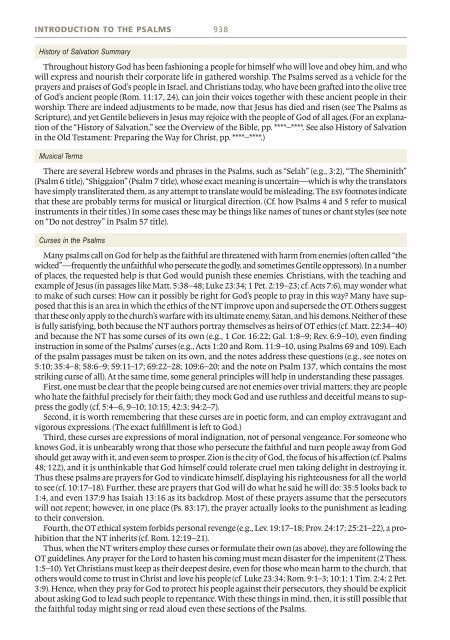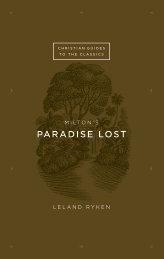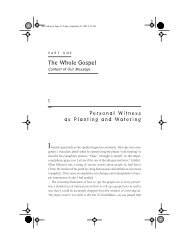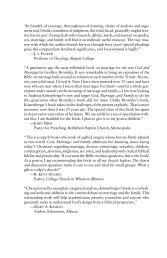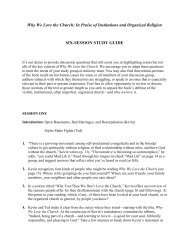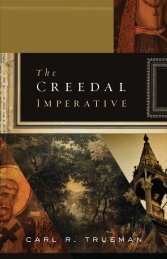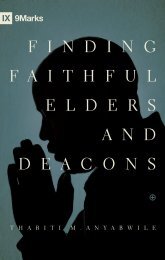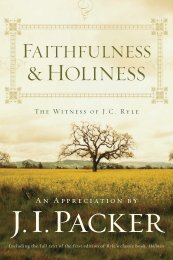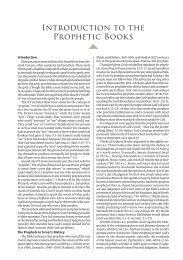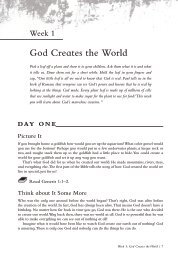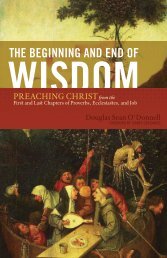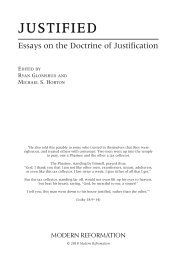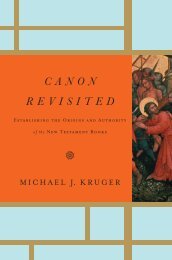ESV Study Bible Sample (Psalms) - Monergism Books
ESV Study Bible Sample (Psalms) - Monergism Books
ESV Study Bible Sample (Psalms) - Monergism Books
- No tags were found...
You also want an ePaper? Increase the reach of your titles
YUMPU automatically turns print PDFs into web optimized ePapers that Google loves.
Introduction to The <strong>Psalms</strong>938History of Salvation SummaryThroughout history God has been fashioning a people for himself who will love and obey him, and whowill express and nourish their corporate life in gathered worship. The <strong>Psalms</strong> served as a vehicle for theprayers and praises of God’s people in Israel, and Christians today, who have been grafted into the olive treeof God’s ancient people (Rom. 11:17, 24), can join their voices together with these ancient people in theirworship. There are indeed adjustments to be made, now that Jesus has died and risen (see The <strong>Psalms</strong> asScripture), and yet Gentile believers in Jesus may rejoice with the people of God of all ages. (For an explanationof the “History of Salvation,” see the Overview of the <strong>Bible</strong>, pp. ****–****. See also History of Salvationin the Old Testament: Preparing the Way for Christ, pp. ****–****.)Musical TermsThere are several Hebrew words and phrases in the <strong>Psalms</strong>, such as “Selah” (e.g., 3:2), “The Sheminith”(Psalm 6 title), “Shiggaion” (Psalm 7 title), whose exact meaning is uncertain—which is why the translatorshave simply transliterated them, as any attempt to translate would be misleading. The esv footnotes indicatethat these are probably terms for musical or liturgical direction. (Cf. how <strong>Psalms</strong> 4 and 5 refer to musicalinstruments in their titles.) In some cases these may be things like names of tunes or chant styles (see noteon “Do not destroy” in Psalm 57 title).Curses in the <strong>Psalms</strong>Many psalms call on God for help as the faithful are threatened with harm from enemies (often called “thewicked”—frequently the unfaithful who persecute the godly, and sometimes Gentile oppressors). In a numberof places, the requested help is that God would punish these enemies. Christians, with the teaching andexample of Jesus (in passages like Matt. 5:38–48; Luke 23:34; 1 Pet. 2:19–23; cf. Acts 7:6), may wonder whatto make of such curses: How can it possibly be right for God’s people to pray in this way? Many have supposedthat this is an area in which the ethics of the NT improve upon and supersede the OT. Others suggestthat these only apply to the church’s warfare with its ultimate enemy, Satan, and his demons. Neither of theseis fully satisfying, both because the NT authors portray themselves as heirs of OT ethics (cf. Matt. 22:34–40)and because the NT has some curses of its own (e.g., 1 Cor. 16:22; Gal. 1:8–9; Rev. 6:9–10), even findinginstruction in some of the <strong>Psalms</strong>’ curses (e.g., Acts 1:20 and Rom. 11:9–10, using <strong>Psalms</strong> 69 and 109). Eachof the psalm passages must be taken on its own, and the notes address these questions (e.g., see notes on5:10; 35:4–8; 58:6–9; 59:11–17; 69:22–28; 109:6–20; and the note on Psalm 137, which contains the moststriking curse of all). At the same time, some general principles will help in understanding these passages.First, one must be clear that the people being cursed are not enemies over trivial matters; they are peoplewho hate the faithful precisely for their faith; they mock God and use ruthless and deceitful means to suppressthe godly (cf. 5:4–6, 9–10; 10:15; 42:3; 94:2–7).Second, it is worth remembering that these curses are in poetic form, and can employ extravagant andvigorous expressions. (The exact fulfillment is left to God.)Third, these curses are expressions of moral indignation, not of personal vengeance. For someone whoknows God, it is unbearably wrong that those who persecute the faithful and turn people away from Godshould get away with it, and even seem to prosper. Zion is the city of God, the focus of his affection (cf. <strong>Psalms</strong>48; 122), and it is unthinkable that God himself could tolerate cruel men taking delight in destroying it.Thus these psalms are prayers for God to vindicate himself, displaying his righteousness for all the worldto see (cf. 10:17–18). Further, these are prayers that God will do what he said he will do: 35:5 looks back to1:4, and even 137:9 has Isaiah 13:16 as its backdrop. Most of these prayers assume that the persecutorswill not repent; however, in one place (Ps. 83:17), the prayer actually looks to the punishment as leadingto their conversion.Fourth, the OT ethical system forbids personal revenge (e.g., Lev. 19:17–18; Prov. 24:17; 25:21–22), a prohibitionthat the NT inherits (cf. Rom. 12:19–21).Thus, when the NT writers employ these curses or formulate their own (as above), they are following theOT guidelines. Any prayer for the Lord to hasten his coming must mean disaster for the impenitent (2 Thess.1:5–10). Yet Christians must keep as their deepest desire, even for those who mean harm to the church, thatothers would come to trust in Christ and love his people (cf. Luke 23:34; Rom. 9:1–3; 10:1; 1 Tim. 2:4; 2 Pet.3:9). Hence, when they pray for God to protect his people against their persecutors, they should be explicitabout asking God to lead such people to repentance. With these things in mind, then, it is still possible thatthe faithful today might sing or read aloud even these sections of the <strong>Psalms</strong>.


